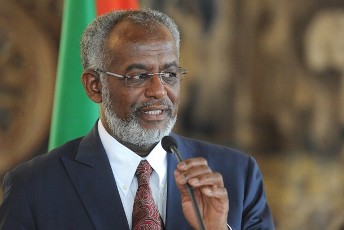Sudan’s FM makes surprise criticism of Bashir comments against Juba
May 14, 2012 (KHARTOUM) – The Sudanese foreign minister, Ali Karti, raised eye brows on Monday when he directed a thinly veiled criticism against the country’s president Omer Al-Bashir over his inflammatory comments against the leaders of neighbouring South Sudan.

He threatened to invade South South and topple the ruling Sudan People’s Liberation Movement (SPLM) which he described as “an insect” that must be crushed and went as far as saying that its leaders need to be “disciplined by the stick.”
Speaking at a parliament session devoted to discussing his last week’s report on the performance of the foreign ministry, Karti said without specifically mentioning Al-Bashir that the behavior of some politicians has had “disastrous effects” on Sudan’s foreign policy, citing examples of how the president’s remarks were understood.
“The talk that they [SPLM leaders] are a group that only understands the stick was interpreted to be referring to the poem of [Abu El-Tayib] El-Mutanabi that says “you shall not buy a slave without a stick” and the term insect was likened to the use of the term cockroaches by the Hutu [ethnic group] against the Tutsi during the Rwandan massacres.”
Karti cautioned that Africa was still reeling from “an inferiority complex” that makes its leaders prone to interpreting any statement within certain contexts even if it was well-intentioned.
Al-Bashir’s terms were spread and popularised by state and anti-South Sudan media, including the conservative newspaper Al-Intibaha, which is owned by Bashir’s uncle. These comments are widely thought to have created an environment that allowed a mob of Islamist extremists to attack a church building in Khartoum and set it on fire.
Parliament accepts UNSC resolution amid reservations
Separately, the Sudanese parliament has announced accepting “with reservations” the UN Security Council’s resolution 2046 on the situation between Sudan and South Sudan despite criticism raised by some MPs that the resolution contains elements targeting Sudan.
The resolution, which was adopted unanimously by the 15-member council on 2 May, ordered Sudan and South Sudan to cease hostilities and return to negotiations on oil, citizenship, border-demarcation and the status of Abyei region, threatening both sides with non-military actions should they fail to conclude talks within three months.
The resolution also dictated that Sudan “cooperates” with the rebel Sudan People’s Liberation Movement North (SPLM-N), which is fighting the government in South Kordofan and Blue Nile states, in order to reach a negotiated settlement to the conflict.
In a statement issued on Monday, the parliament’s committee of external relations announced acceptance of the resolution but inserted reservations calling for prioritisation of security issues during negotiations.
The parliament also rejected the resolution’s use of the word “disputed” in referring to areas contested between the two countries as well as any calls for dialogue with the SPLM-N since the situation in South Kordofan and Blue Nile was “an internal affair.”
The parliament’s speaker, Ahmed Ibrahim al-Tahir, warned during Monday’s session that Sudan’s respect of the international community hinges on the latter’s respect of the country’s sovereignty.
“Any detraction of our sovereignty will render their resolutions unacceptable to us. We cannot afford to compromise our values.”
The head of the ruling National Congress Party’s (NCP) parliamentary bloc, Ghazi Salah Al-Din Al-Atabani, described the UNSC resolution as malicious and detractive of Sudan’s rights.
He, however, acknowledged that the government cannot reject the resolution since it also concerns South Sudan and that the latter’s acceptance of it would gain Juba international sympathy and direct the frustration of the international community towards Khartoum.
(ST)
